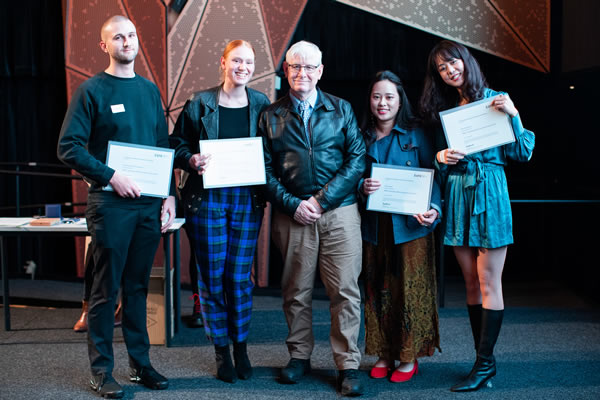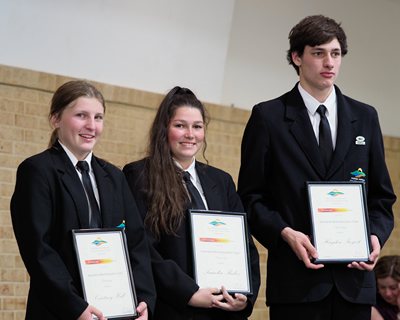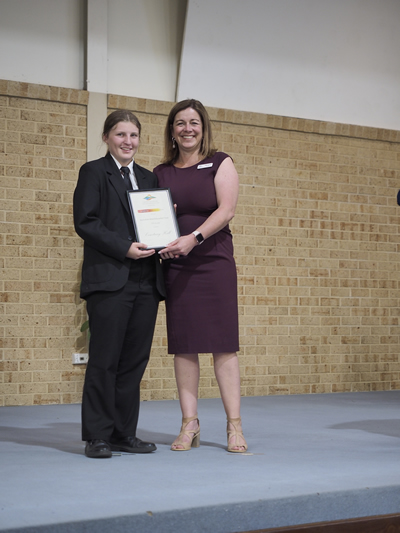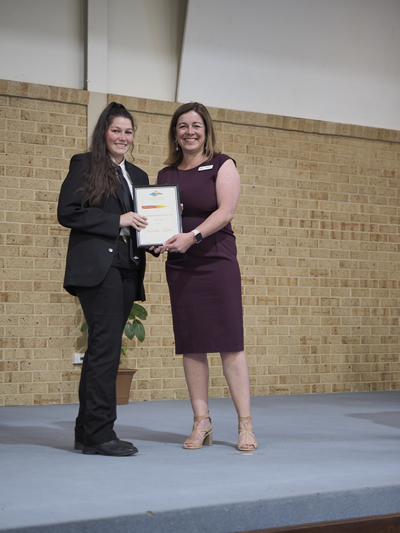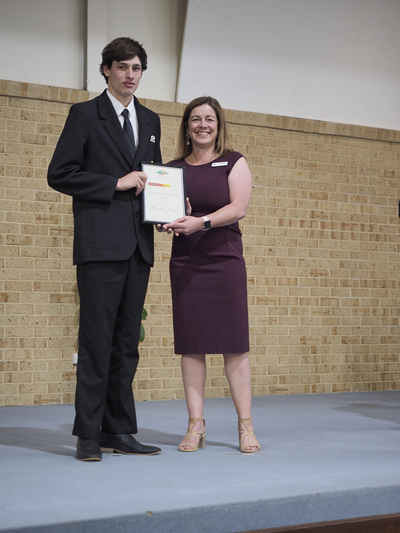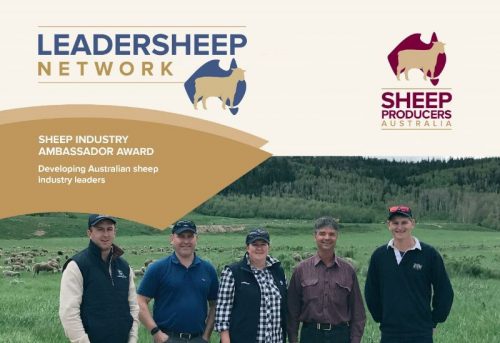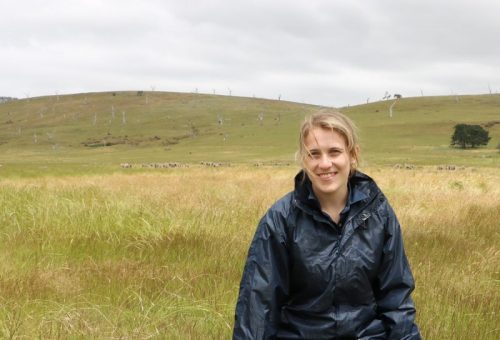Each year AWET distributes grants to selected Fashion Design students, to facilitate purchase of wool-rich fabric for their final year design projects. The students are selected by the Fashion School. University of Technology Sydney is one of the participating schools. This year’s students were Hazel Dong, Ying Huang, Tegan Kearney, Domenic Roylance. The students presented their collections at UTS on Thursday 14th November, 2019
From L to R: Domenic Roylance, Tegan Kearney, Peter Sommerville (Secretary of AWET), Ying Huang, Hazel Dong.
The Trust supports the VET sector via a number of scholarships, valued at $3,000 each, being made available per year to students attending institutions in this sector.
Applications for these scholarships are made on behalf of the student(s) by the institution at which the student is enrolled.
One of the Colleges utilising these scholarships is the West Australia College of Agriculture – Cunderdin
This year the College selected 3 students – Courtney Hall, Tameka Baker and Hayden Fiegert. Each was awarded a scholarship. The scholarships were awarded to the students by the Principal of the College, Sally Panizza, on behalf of AWET at the College’s Valedictory Ceremony on Friday 15th November 2019.
From L to R: Courtney Hall, Tameka Baker, Hayden Fiegert.
Courtney Hall and Sally Panizza.
Tameka Baker and Sally Panizza.
Hayden Fiegert and Sally Panizza.
Vision
Rural educational excellence through innovation, passion and collaboration.
Mission
- Foster a safe and healthy residential and learning environment in which the whole College promotes the DOE values of Learning, Excellence, Equity, Care, Integrity and Respect.
- Enable all students to develop the knowledge, skills and confidence to achieve their individual potential and contribute to society.
- Provide opportunities for students to develop knowledge, skills and values within the context of rural industries.
- Ensure all students achieve nationally recognised vocational qualifications and Secondary Graduation (WA Certificate of Education).
When the Wool Technology journal was first published in 1954 by the University of New South Wales it was a unique vehicle for communicating technical information to sheep and wool industry participants. The journal also provided an advertising vehicle for Merino studbreeders and industry service companies in its earlier years.
There have only been three editors during its life. Professors Pat McMahon and Euan Roberts edited the journal from 1954 until 1976. Professor Roberts remained editor until 1992 when Prof. Cottle became editor. The journal was published from UNSW, WRONZ and then UNE before it developed into the Internatonal Journal for Sheep and Wool Science.
Many journal papers were generated from the annual Wool Schools held at the School of Wool and Pastoral Sciences at UNSW. School staff and graduates have been responsible for much of the research in the sheep and wool industry with many School graduates taking up research and extension positions in CSIRO, State Departments, Universities etc.
When the journal(s) ceased publication in 2010 the then Editor, Professor David Cottle created an on-line archive using Open Journal Systems (OJS) as a platform. Subsequent to his retirement the management of this archive was transferred to the Australian Wool Education Trust.
The Trust has overseen an updating of the OJS’s software and relocated the archive to an OJS server to ensure its longevity going forward.
Consistent with its approach to supporting wool and sheep education the Trust has made access to the archive open source to registered users i.e. available at no fee.
To access the archive use this link Sheep and Wool Journal
OJS is a publishing system providing a submission, review, editing and publishing process that meets the normal requirements for science based publications. However, at this point submissions for publication are not being accepted.
Media Release
The Federation of Australian Wool Organisations (FAWO) is a peak wool industry body whose Membership comprises AWEX, AWH, AWI, AWTA, and national Associations representing wool growers, brokers, exporters and processors. It represents Australia at the International Wool Textile Organisation (IWTO) and addresses wool industry issues of cross sector importance both locally and internationally. These include issues such as biosecurity matters.
FAWO achieved two major milestones at its Annual General Meeting last week.
Firstly, it passed a number of changes to its Constitution that are designed to encourage wider participation in its activities. These start with a change in name to Wool Industries Australia (WIA) and include other changes of a structural nature.
Secondly, it celebrated these changes with the organisation of a Forum in which its Member organisations were asked to speak about the impact of the drought on their sector of the industry. Over 70 people from growers to retail; and from the service sectors participated. Discussion was wide ranging and free flowing.
The commercial issues of having 12.1% less wool produced in 2018/19 and a further 5% less expected in 2019/20 are very apparent, as is the need for wool growers to purchase grain and hay to feed their sheep.
But, less apparent are the impacts of social and welfare issues on-farm and in rural towns, where there are less funds available for spending and for employment. Brokers referred to the personal impacts on their staff arising from their direct interaction with wool growers who are living with the drought. They also referred to the loss of expertise from the industry.
Also less apparent are the greater difficulties that wool exporters may have in meeting customers’ contract specifications, particularly for wool types that were not in large supply, even before the drought. This is given greater emphasis by the increasing demand from Australia’s customers for wools that meet traceability, sustainability and animal welfare requirements.
The importance of responding to this type of challenge was highlighted in a presentation to the Forum by Country Road CEO, Scott Fyfe. Country Road’s vision includes a “Responsible Wool Strategy”, which states:
“All Country Road’s pure wool and wool rich products will be fully traceable and certified by a credible third–party to ensure high animal welfare standards and sustainable farming practices by Winter 2025.”
Leading Italian processor, Giovanni Schneider described these issues as becoming more important than wool quality issues when speaking at the recent IWTO Congress in Venice.
The full presentations can be found at https://www.fawo.org.au/publications/
| David Michell | Bianca Heaney |
| Chairman | Secretary |
| 08 8209 4400 | 03 9311 0103 |
The Sheep CRC has finally concluded its objectives and as of the 30th June 2019 it will be wound up. However, the accomplishments of the CRC will continue to yield benefits to the sheep and wool industry.
Read the final Sheep CRC Newsletter
When the AWTA Ltd Wool Education Trust was first formed in 1997 there were 5 Trustees, 3 appointed by AWTA Ltd and 2 by the Australian National Committee of the International Wool Textile Organization. This was increased to 8 after a grant from AWI was offered and accepted, allowing AWI to appoint 3 Trustees, with FAWO replacing the ANC. The name of the Trust was changed to the Australian Wool Education Trust.
Over the past two years the Trustees have reviewed the management of the Trust’s investment portfolio. As a consequence, Trustees are now less directly involved in the investment decisions, having established a portfolio based on indexed funds, and providing the investment manager with parameters to be applied in adjusting the portfolio to meet the Trust’s investment objectives.
This has enabled the Trustees to focus more on the Trust’s educational objectives:
- To support the education of students, growers and others considered to be capable of contributing to the development of the wool industry, from the growing to the textile product stage, including in such subjects as:
- fibre science, including fibre and follicle development, fibre morphology and characteristics, and their effects on processing performance and product properties;
- wool production, including selection, preparation for sale and packaging;
- wool metrology, including testing technology, process control, Total Quality Management techniques and the prediction of processing performance;
- wool and textile marketing, including trading, processing and promotion of products made wholly or partially from wool;
- to fund attendance at educational conferences and to fund scholarships and prizes;
- to fund educational resources, educational conferences, educational programs and educational institutions and colleges; and
- to fund scientific research undertaken for the advancement of education.
The Trustees unanimously decided to reduce their number from 8 to 5. This has been facilitated by the resignation of Mr Brian van Rooyen (the current Chairman), Mr Gordon Dickinson and Mr Geoff Fisken.
The continuing Trustees are:
| AWTA Ltd | Michael Jackson: (Chairman of Trustees)
Managing Director, AWTA Ltd Director of New Zealand Wool Testing Authority Ltd and JinAo Testing Company Ltd Peter Sommerville: (Secretary of Trustees) Principle, PJS Services Pty Ltd, formerly Corporate Development Manager, AWTA Ltd, now retired. |
| FAWO | John Lewis:
Formerly Divisional Manager, AWTA Ltd Product Testing; Managing Director, Macquarie Textiles Group; now retired |
| AWI | Cameron Archer AM PSM:
Chairman, Primary Industries Education Foundation. Formerly Principal, Tocal Agricultural Centre, now retired Andrew Vizard: Principle Fellow, Faculty of Veterinary & Agricultural Science, Melbourne University |
By unanimous agreement the Trustees appointed Mr Michael Jackson as Chairman.
These changes take effect from 30th June 2019.
Project: Measurement of appetite, feed-use efficiency and fat metabolism to improve estimation of genotype profitability and selection indices in Merinos
This PhD will be embedded within a large AWI-funded project that aims to quantify differences in systems efficiency between animals and between sire groups. The project will measure feed intake, feed use efficiency and whole body energy on over 700 progeny from 30 sires from the ‘Merino Lifetime Productivity’ project.
The hypotheses tested will include:
(i) There are physiological differences between animals and sire groups that result in variation in whole body energy;
(ii) There is variation between animals and sire groups in feed intake; and
(iii) The variation in whole body energy and feed intake can be combined with whole of flock bio-economic modelling to quantify differences in systems efficiency between animals and sire groups.
A full PhD Scholarship ($27,000 pa x 3 years) will be offered from Murdoch University based in Perth, and opportunities to ‘top up’ the stipend from other funding sources will be explored. The project is well resourced and the student would commence the PhD program as soon as possible. Expressions of interest are encouraged from students that have a passion for the wool industry and that achieved 1A and 2A honours in Animal Science/Agricultural Science. Practical skills in sheep handling and measurements are also desirable.
For further details contact:
Associate Professor Andrew Thompson, 0437 316 117, Andrew.thompson@murdoch.edu.au
Sheep Producers Australia is offering winners of the Sheep Industry Ambassador Award the opportunity to attend the New Zealand Sheep Industry Ambassador Program in March 2019.
The program will foster and grow the up and coming leaders in the sheep industry.
The award includes a week-long study tour from 25-30 March, with visits showcasing the industry supply chain across the North and South Islands with ambassadors of the New Zealand and United States sheep industries.
Beyond the trip, a range of other opportunities and professional development are also included as part of the award. Successful applicants will have the chance to represent sheep producers and their interests at a national level by contributing to industry initiatives with the SPA Board or Committees. This input will influence the strategy, policy development, advocacy or industry leadership to guide the industry’s future.
Sheep Producers Australia and Meat & Livestock Australia are proud to offer this opportunity to build leadership capability for the sheep industry.
- You could be the next SPA Sheep Industry Ambassador if you:
• Currently work in the sheep industry (either on-farm or in another capacity)
• Desire to actively contribute to SPA and the sheep industry
• Are 25-40 years of age (at 1 March 2019)
• Are able to travel away from your business or work from 24-30 March 2019
Applications close 9am, Monday 11 February. Please submit to leadership@sheepproducers.com.au.
For more information and to download the application form visit the SPA website.
Tasmanian Institute of Agriculture (TIA) student Lauren Rowlands has won a national scholarship and three awards recognising her achievements in agricultural science.
An Undergraduate Project Scholarship from the Australian Wool Education Trust (AWET) – one of 15 awarded nationally – is supporting Ms Rowlands’ honours research into Merino wool production.
The research trial is taking place at Stockman Stud in the Southern Midlands, the region where Ms Rowlands grew up.
“Through my research, I hope to find out the most productive pathway for castrated Merino male lambs, known as wethers,” Ms Rowlands said.
“Farmers want to know if wethers produce better meat or wool, and what they should be fed. I’m testing this out through two different pasture diets.
“With funding from the scholarship, my research will be especially rigorous. For example, I’m able to get the fleece samples professionally tested,” she said.
AWET Secretary Mr Peter Sommerville said the industry-focused project design was a key reason for the selection panel’s decision. “Through the project, Lauren will develop her knowledge of wool production and solve a major question for local farmers,” Mr Sommerville said.
“The scholarship recognises Lauren’s keenness to contribute to the wool industry and her ag science know-how. She shows huge potential for a successful career in agriculture.”
In December, Ms Rowlands won the University of Tasmania’s Alan Bray Prize in Animal Science for highest grades in the Animal Science Unit
She was also awarded for the best overall results at third-year level in the Bachelor of Agricultural Science at TIA.
At just 21, Ms Rowlands is already working part-time in a field related to her studies.
“During my degree, I enjoyed doing work experience in biosecurity with the Tasmanian Government, and I’ve since landed a casual job as a biosecurity inspector,” Ms Rowlands said.
Last year Ms Rowlands volunteered for TIA’s National Merino Challenge team, which won first place and she was awarded the Tertiary Overall Champion.
“Winning the National Merino Challenge 2018 influenced my decision to do an Honours project in wool research,” she said.
“The previous summer I had a completely different agricultural experience doing a practical internship on grapevine research with TIA.”
“All this experience helps you nut out which direction you want to go in. “My advice to students is to jump onto work experience and put yourself out there.”
Media contact:
Claire Baker,
Research Communications Officer
(03) 6226 7637
c.baker@utas.edu.au
Information released by:
Communications and Media Office University of Tasmania
+61 3 6226 2124
Media.Office@utas.edu.au
Twitter.com/utas_newsroom
This is your last chance to tap into the minds of the Sheep CRC’s research team about new and innovative ways to improve your sheep business. After 18 years, the conference marks the final public event for the Sheep CRC before it ceases operations at the end of June 2019. Don’t miss this unique opportunity to celebrate the innovation, impact and transformational technologies the Sheep CRC has delivered.
